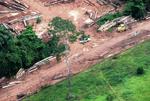An amendment to undermine protections in Brazil’s 1965 forestry code has passed it first legislative barrier, reports the World Wide Fund for Nature-Brasil (WWF). Yesterday the amendment passed a special vote in the Congress’s Special Committee on Forest Law Changes.
Pushed by a bloc of Brazilian legislatures known as the ‘ruralistas’, due to their ties to big agriculture, the amendment would scale down the forestry code’s protection of Brazil’s great forest ecosystems, including the Amazon and the Atlantic Forest. The amendment would change the forestry code’s requirement that Amazonian landowners must retain 80 percent of their land as legal forest reserves. According to the ruralistas, the law hurts agricultural development, even though it is largely flouted. The amendment would also provide amnesty to any farmers or ranchers who have practiced illegal deforestation, incorporating over 40 million hectares of illegally deforested land.
Brazil’s forestry code, one of the most progressive in the world, also extends protection to certain landscapes: riverbank, steep slopes, and hill tops, known as Areas of Permanent Preservation (APPs). However, the amendment would move APPs from protection under the federal governments to individual states, allowing states to cut their APPs by up to half.
Environmentalists contend that the amendment could open the door to a new era of massive forest loss in the Amazon and Atlantic Forest, undermining Brazil’s many initiatives that have successfully slowed deforestation as well as its greenhouse gas emission pledges. They further argue that Brazil has the capacity to increase agricultural output without cutting down additional forests, if farmers simply use existing technologies and knowledge to raise yields.
The amendment will be voted on by the Brazilian Congress nest. If it passes, the President will have a chance to veto, but WWF-Brasil believes such a veto is unlikely during the run-up to October elections.
For more information on the amendment: Amazon and Atlantic Forest under threat: politicians press to dilute Brazil’s forestry law.
Related articles
The changing nature of illegal logging – and illegal logging investigations – in Brazil’s Amazon

(07/08/2010) Operation Jurupari followed on several previous Brazilian Federal Police investigations into SEMA, including: Operation Curupira I (June 2005); Curupira II (August 2005); Mapinguari (2007), Arc of Fire (2008), Termes (April 2008); and Caipora (2008). It was led by Franco Perazzoni, Brazilian Federal Police “Delegado” (or chief), who, since 2006, has headed the environmental crimes unit in Mato Grosso and been responsible for about 300 investigations on environmental crimes, of which about 75% were on illegal deforestation in federal areas. The nature of the illegal deforestation has changed over the years.
Top officials busted in Amazon logging raids, but political patronage may set them free

(07/08/2010) After two years of investigations, the Brazilian Federal Police arrested some of the most important politicians and authorities for illegal logging in the Amazon. Code-named Operation Jurupari, the Brazilian Federal Police uncovered a massive illegal logging scheme that resulted in the arrests of over 90 people and caused an estimated $500 million in damage to the Amazon rainforest. Over 496 square kilometers (192 square miles), an area the size of California or Spain, were affected and an estimated 1.5 million cubic meters (642 million board feet) of timber was illegally extracted. While the investigation focused on activities in the state of Mato Grosso, which is located in the southern Amazon and is one of the most deforested regions largely due to clearing land for expanding soya farms, it touched numerous others, including São Paulo, Paraná, Rio Grande do Sul, Espirito Santo, Minas Gerais and Distrito Federal.
Amazon and Atlantic Forest under threat: politicians press to dilute Brazil’s forestry law

(07/01/2010) A group of Brazilian legislatures, known as the ‘ruralistas’, are working to change important aspects of the Brazil’s landmark 1965 forestry code, undermining forest protection in the Amazon and the Mata Atlantica (also known as the Atlantic Forest) and perhaps heralding a new era of booming deforestation. The ruralistas, linked to big agribusiness and landowners, are taking aim at the part of the forestry code that requires landowners in the Amazon to retain 80 percent of their land area as legal reserves, arguing that the law threatens agricultural development.